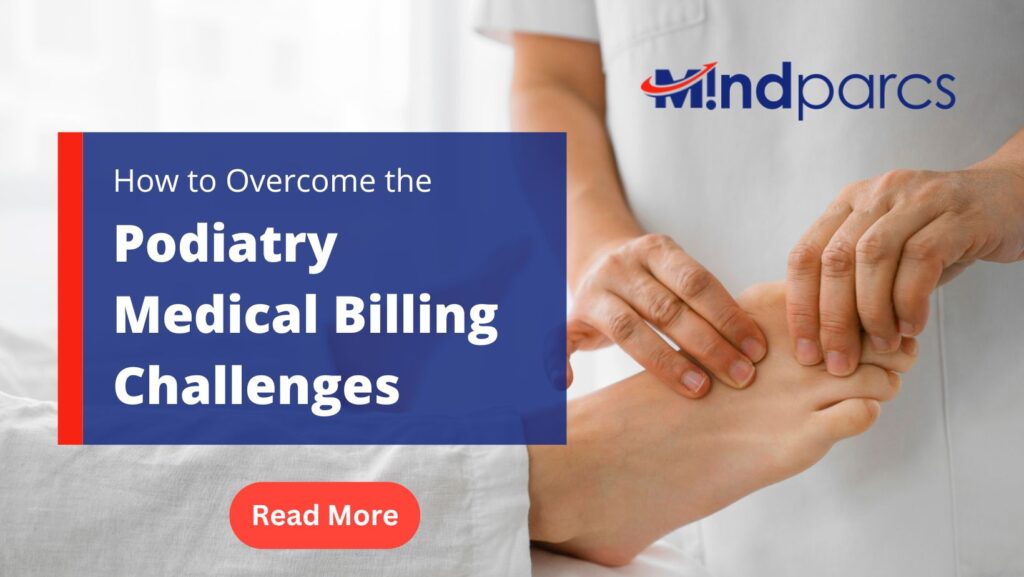
How to Overcome the Common Challenges in Podiatry Medical Billing
Overcome the Common Challenges in Podiatry Medical Billing Podiatrists have a crucial role in securing the mobility and overall health of individuals. However, their practices

Podiatrists have a crucial role in securing the mobility and overall health of individuals. However, their practices often come across various challenges, especially in medical billing. The details of podiatry billing require a complete understanding of medical coding, compliance, and reimbursement processes, making it a challenging task for both healthcare professionals and practices.
Podiatry medical billing requires a strategic way to optimize revenue and improve overall practice efficiency. This blog post explores the common challenges that Podiatrists face in medical billing and provides valuable insights on how to overcome them.
Accurate coding, documentation, and claim submission are crucial for podiatry practitioners. However, they often face challenges that delay the billing process. In this blog post, we will discuss some of the most common issues in podiatry medical billing and recommend solutions to overcome them.
1. Complex Coding Systems
One of the most important challenges is the complex podiatry coding systems that govern reimbursement. Podiatrists must stay updated in Podiatry CPT and ICD codes to accurately document and bill for services offered. Failing to use accurate codes can lead to claim rejections and payment delays, negatively affecting the practice's financial health.
To overcome this challenge, consistent training for podiatry medical coding updates is important. Offering the training to the staff ensures that coders and billing personnel are well-versed in the latest coding changes, and reduces the risk of errors. Additionally, using technology solutions that integrate automatic code updates can streamline the coding process.
2. Documentation and Compliance Issues
Accurate and perfect documentation is the backbone of successful podiatry billing. However, practices are often challenged with incomplete or inconsistent documentation, leading to claim denials. Ensuring compliance with healthcare guidelines is essential to avoid legal repercussions and financial penalties.
To overcome this, practices should implement standardized rules for keeping documentation. Having regular audits to identify and resolve documentation gaps makes sure that the practice remains compliant with industry regulations.
3. Pre-authorization & Insurance Verification
Navigating the complex process of pre-authorization and insurance verification can be a significant challenge in podiatry billing. Practices often face delays and denials due to the lack of patient insurance coverage verification or the absence of pre-authorization for specific procedures.
To overcome this, implementing a strong insurance verification process is important. Practices should consider adopting automated verification systems that can quickly and accurately confirm patient insurance details, eligibility, and pre-authorization requirements.
4. Denial Management
Claim denials are a required part of podiatry medical billing, and it is important to manage them effectively to reduce revenue loss. The lack of regulated appeals processes and insufficient follow-up on denied claims can lead to missed revenue opportunities.
To overcome this issue, practices should establish a systematic approach to identify, analyze, and appeal denied claims promptly. Implementing technology-driven solutions that track denials, analyze patterns, and automate the appeals process can significantly improve the overall efficiency of denial management.
5. Lack of Patient Communication on Financial Responsibility
Many challenges arise from poor communication regarding financial responsibilities, leading to confusion, disputes, and delayed payments.
To overcome this, practices must prioritize honest conversations with patients about their insurance coverage, co-payments, and out-of-pocket expenses can significantly reduce billing disputes. Providing written estimates of expected costs and offering flexible payment options can further improve patient billing experience.
6. Revenue Cycle Management Optimization
Managing the revenue cycle is a constant challenge for every practice. Any inefficiencies in the process, from scheduling appointments to submitting claims and receiving reimbursements, can result in revenue loss, delayed payments, and increased costs.
By implementing integrated Practice Management (PM) and billing systems, practices can improve overall efficiency, minimize manual intervention, and reduce the likelihood of errors.
Podiatry billing can be complex and requires a full approach that includes podiatry coding accuracy, insurance verification, compliance, patient communication, denial management, and revenue cycle optimization. By addressing these common challenges systematically, podiatry practices can improve their financial health, and streamline operational processes.
With our expertise, we ensure coding accuracy, insurance verification, compliance, patient communication, denial management, and overall revenue cycle optimization. Partner with MindParcs Inc for a reliable and efficient solution to your podiatry billing needs.

Overcome the Common Challenges in Podiatry Medical Billing Podiatrists have a crucial role in securing the mobility and overall health of individuals. However, their practices

Urgent Care Medical Billing Mistakes & Solutions to Resolve In healthcare industry, urgent care specialties play an important role in offering efficient medical services. However,
